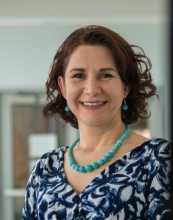CBE Seminar: Microscale Electrokinetics for Bioparticle Separations

Professor and Founding Faculty
Biomedical Engineering Department
Rochester Institute of Technology
Abstract: Microfluidics has revolutionized the manner in which many assessments/processes are carried out. Miniaturization offers attractive advantages over traditional bench-scale techniques: only small quantities of samples and reagents are required, higher resolution and sensitivity, improved level of integration, lower cost and much shorter processing times. Electrokinetics (EK) is one of the main pillars of microfluidics, electric-field driven techniques are suitable for a wide range of applications due to their simplicity and robustness. Furthermore, EK-based microfluidic devices can exploit both linear and nonlinear EK phenomena, allowing for precise particle control in detection applications.
This seminar will be focused on the design of insulator-based electrokinetic (iEK) microfluidics devices that combine electrophoresis (EP), electroosmosis (EO) and dielectrophoresis (DEP) to achieve the characterization of polystyrene microparticles, viruses and cells. This work includes extensive experimentation with microdevices made from PDMS and mathematical with COMSOL multiphysics. Within iEK, there are four main components; EO, linear EP, DEP and non-linear EP of the second kind. It must be noted, however, that while many of the reports available in the literature attribute a great extent of particle behavior at higher electric fields to DEP, publications from the physics field and our recent work suggest that EP of the second kind may be the dominating mechanism of particle migration at high electric fields. Our group has developed novel approaches that allow identifying a unique EK signature of microorganisms that can be used to design tailored iEK microfluidic devices to be used for the rapid enrichment and identification of microorganisms. These findings from this study demonstrate the potential of iEK microfluidic devices for the rapid differentiation and identification of microorganisms by employing unique electrokinetic signatures.
Bio: Blanca H. Lapizco-Encinas is a professor and a founding faculty at the Department of Biomedical Engineering at the Rochester Institute of Technology. Her current research efforts are focused on developing electrokinetic-based microdevices that would answer the needs of a wide array of applications from cell assessments for clinical/biomedical applications to food safety and environmental monitoring. Her research work has been funded by the NSF, NIH and other funding agencies in the U.S. and Mexico. She has received research awards from the Mexican Academy of Sciences and the L’OREAL for Women in Science program. She recently received the 2022 Service Award from the AES Electrophoresis Society, the 2021 Board of Trustees Scholarship Award at Rochester Institute of Technology. She serves as editor-in-chief for the Journal ELECTROPHORESIS published by Wiley, and has served as vice president and councilor for the AES Electrophoresis Society. She has published more than 130 peer-reviewed research articles, conference proceedings and book chapters. Lapizco-Encinas is a strong supporter of undergraduate research, and many undergraduate students working under her guidance have published peer-reviewed journal articles including first-author publications. She has organized several conferences including the Annual AES Meeting @ Scix and the International Symposium on Electroseparation and Liquid Phase-Separation Techniques Meeting. Lapizco-Encinas received her bachelor's and master's degrees in chemical engineering in Mexico, and her doctorate also in chemical engineering from the University of Cincinnati. Prior to joining RIT, she was a postdoctoral researcher at Sandia National Laboratories and held positions at Tennessee Tech. in the U.S., and Tecnológico de Monterrey and CINVESTAV-Monterrey in Mexico.
Host: Assistant Professor Tayloria Adams
Share
Upcoming Events
-
CBE 298 Seminar: Teaching Transport Phenomena Through Observation - From Einstein’s Tea Leaves to Dissolving Skittles
-
MSE 298 Seminar: Basic Materials Science Aspects In Sustainable Metallurgy
-
EECS Seminar: Terahertz Metasurface Quantum-Cascade Vertical-External-Cavity Surface-Emitting-Lasers (VECSELs)
-
2026 Annual Design Review
-
MSE 298 Seminar: Identification and Engineering of Interlayer Stacking Configurations in van der Waals Crystals
